SEOUL, Dec 7 — South Korea has been in turmoil since President Yoon Suk Yeol imposed martial law and sent troops and helicopters to parliament before being forced into a U-turn in a night of extraordinary drama.
With Yoon facing a touch-and-go impeachment motion in parliament today, AFP looks at recent events in a country thought to have consigned dictatorships to history.
Prelude
Yoon, elected in 2022, lurches from crisis to crisis and becomes a lame duck after the opposition wins control of parliament in elections in April this year.
For months, some opposition lawmakers accuse Yoon of a slide towards authoritarianism.
One lawmaker, Kim Min-seok, in September even claims Yoon has martial law in mind, but almost no one takes it seriously.
People watch a television news screen broadcasting live footage of South Korean President Yoon Suk-yeol at a press briefing. On Tuesday at 10.23pm, (1323 GMT/9.23pm Malaysian time) Yoon comes on screen to declare martial law to protect South Korea from ‘communist forces’. — AFP pic
National address
On Tuesday at 10.23pm, (1323 GMT/9.23pm Malaysian time) Yoon comes on screen to declare martial law to protect South Korea from “communist forces”.
Yoon, who has been in a legislative dispute over next year’s budget, says the opposition had “paralysed governance” and claims parliament is a “haven for criminals”.
Defiance
Opposition leader Lee Jae-myung livestreams himself being driven to the National Assembly, calling on lawmakers and protesters to join him in opposing the “illegal imposition of martial law”.
An emergency session is scheduled for later that night, and lawmakers scramble to parliament, some leaping over fences, to vote down Yoon’s decree.
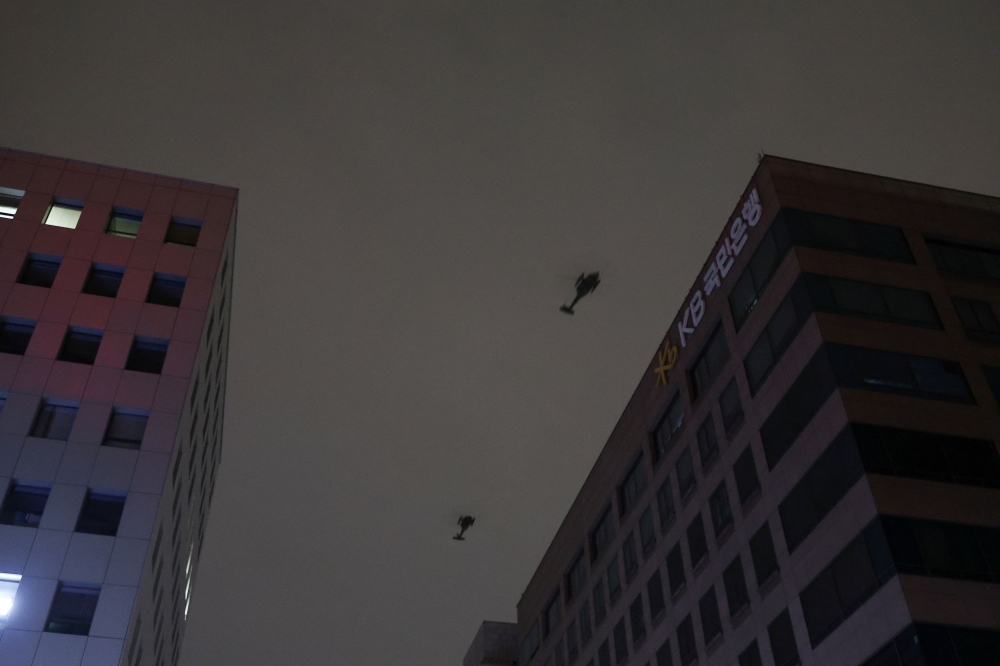
Helicopters fly, after South Korean President Yoon Suk Yeol declared martial law, in Seoul December 4, 2024. — Reuters pic
Helicopters
Helicopters carry special forces to parliament, as other troops scale perimeter fences and smash windows to get in.
Sometime after midnight, soldiers attempt to enter the main parliament, with scuffles breaking out as staffers and lawmakers bar their way with office furniture as barricades.
As news of Yoon’s stunning move spreads at home and abroad, thousands of protesters make their way to parliament.
Rejection
At 1.03am Wednesday, lawmakers vote 190-0 to nullify Yoon’s declaration.
Soon after, soldiers begin withdrawing. Protesters chant: “Arrest Yoon Suk Yeol!”.
“We are watching the recent developments in (South Korea) with grave concern,” the US State Department says.
Hours pass and finally at 4.20am, Yoon comes on television again and says he will lift martial law. Protesters celebrate. Yoon goes to ground.
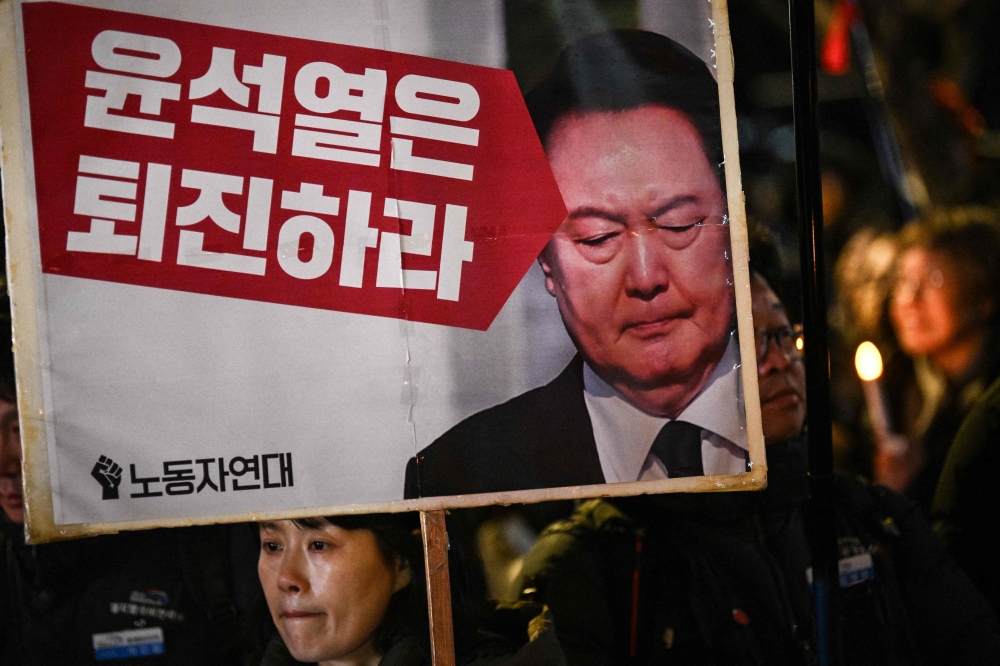
A woman holds a sign that reads ‘Yoon Suk Yeol should step down’ during a candlelight vigil against South Korea President Yoon in Seoul on December 4, 2024. South Korea’s opposition moved to impeach Yoon on December 4 after his extraordinary but short-lived imposition of martial law that brought thousands of protesters to the streets. — AFP pic
Impeachment motion
As bleary-eyed protesters and lawmakers recover, six opposition parties file an impeachment motion against Yoon at 2.40pm on Wednesday.
Yoon “gravely and extensively violated the Constitution and the law” and sought to “evade imminent investigations… into alleged illegal acts involving himself and his family,” the motion says.
Opposition lawmakers also file separate complaints of “insurrection” against Yoon, his defence and interior ministers and key military and police officers.
Thousands of protesters begin marching to towards the presidential office while others rally at the National Assembly.
Defence Minister Kim Yong-hyun offers to resign. Later this is accepted and he is slapped with a travel ban.
Enquiry
On Thursday, the head of Yoon’s People Power Party (PPP), Han Dong-hoon, says it will block the impeachment motion. Only eight of its MPs need to break ranks for it to pass.
Police announce they are investigating Yoon and others for “insurrection”, and lawmakers start to grill those involved.
General Park An-su says he only found out on television that martial law had been declared, and subsequently that he was in charge of the operation.
He said he signed a decree banning anti-government political activities after being told the defence minister had checked its legality.
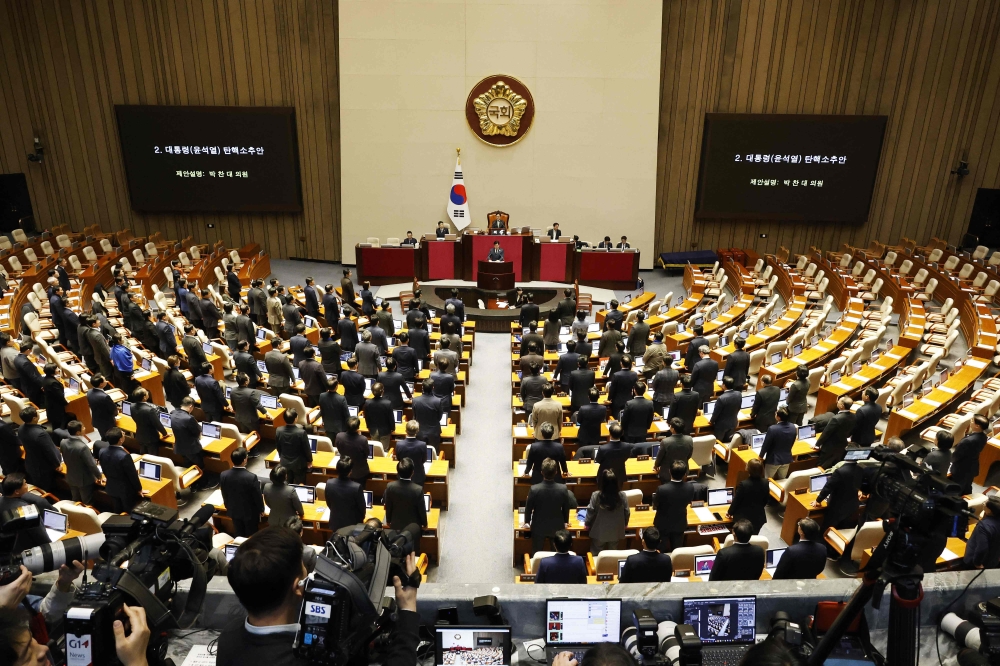
GA general view shows lawmakers in the voting chamber during the plenary session for the impeachment vote of President Yoon Suk Yeol at the National Assembly in Seoul on December 7, 2024. — Jeon Heon-kyun/Pool/AFP pic
Han turns
Yesterday morning, Han warns that South Korea is in “great danger” if Yoon remains in office, implying the president could declare martial law again.
Han says “credible evidence” suggests that Yoon ordered the arrest of key politicians. A fresh poll Yoon’s approval rating hits a record low of 13 per cent after the declaration of martial law.
Special Forces Commander Kwak Jong-geun says he was ordered to “drag out” lawmakers from parliament. Three senior commanders are suspended.
US Secretary of State Antony Blinken tells his counterpart Cho Tae-yul that Washington “expects the… democratic process to prevail”.
Impeachment looks increasingly likely. Opposition MPs hole up in parliament all night and protesters hunker down outside in freezing temperatures.
“With the impeachment vote set for tomorrow, the hours leading up to it are extremely precarious,” opposition leader Lee Jae-myung tells AFP.
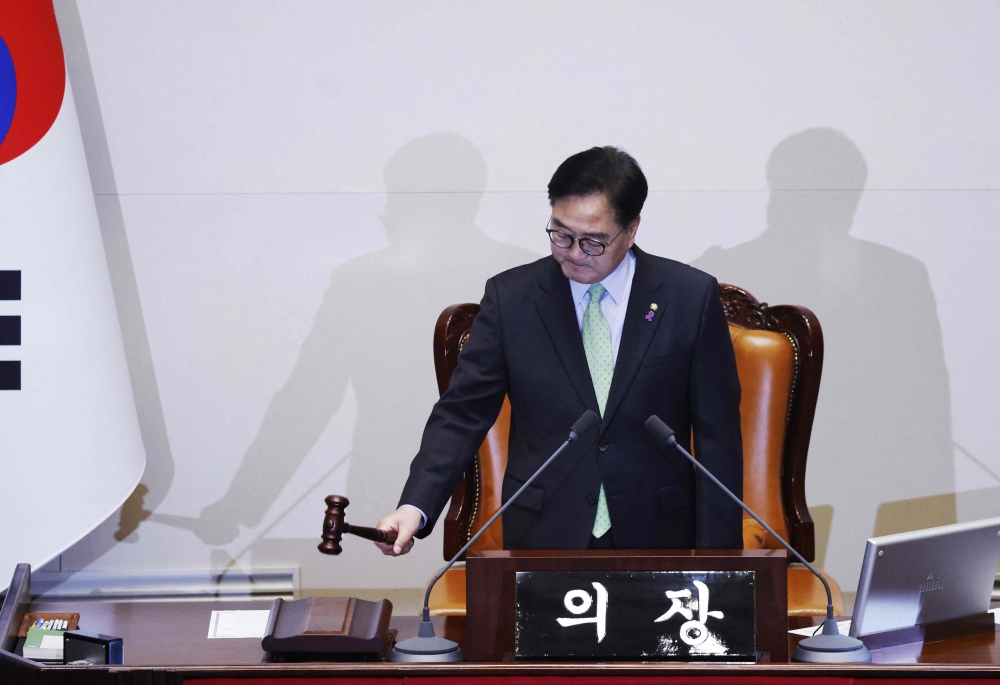
South Korean National Assembly Speaker Woo Won-shik bangs the gavel to indicate the start of the plenary session for the impeachment vote of President Yoon Suk Yeol at the National Assembly in Seoul on December 7, 2024. — Jeon Heon-kyun/Pool/AFP pic
D-Day
Despite Han’s comments, the PPP decides late yesterday that it will still vote against the impeachment vote, scheduled for Saturday evening.
Today at 10am, Yoon finally reappears, and in two-minute televised address apologises for the “anxiety and inconvenience”.
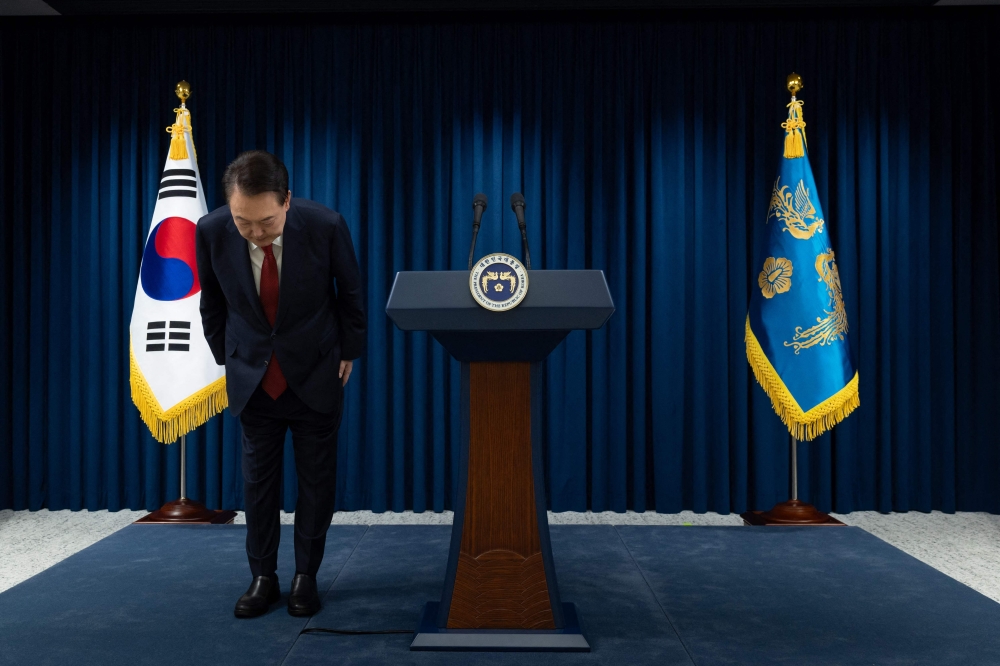
This handout photo taken and released on December 7, 2023 by the South Korean Presidential Office shows South Korea’s President Yoon Suk Yeol bowing after the end of his address at the Presidential Office in Seoul. — South Korean Presidential Office handout pic via AFP
But he stops short of resigning.
“I will not shy away from the issue of legal and political responsibility regarding the declaration of martial law,” Yoon says.
“I will leave it up to our party to stabilise the political situation in the future, including my term of office,” he says. — AFP








